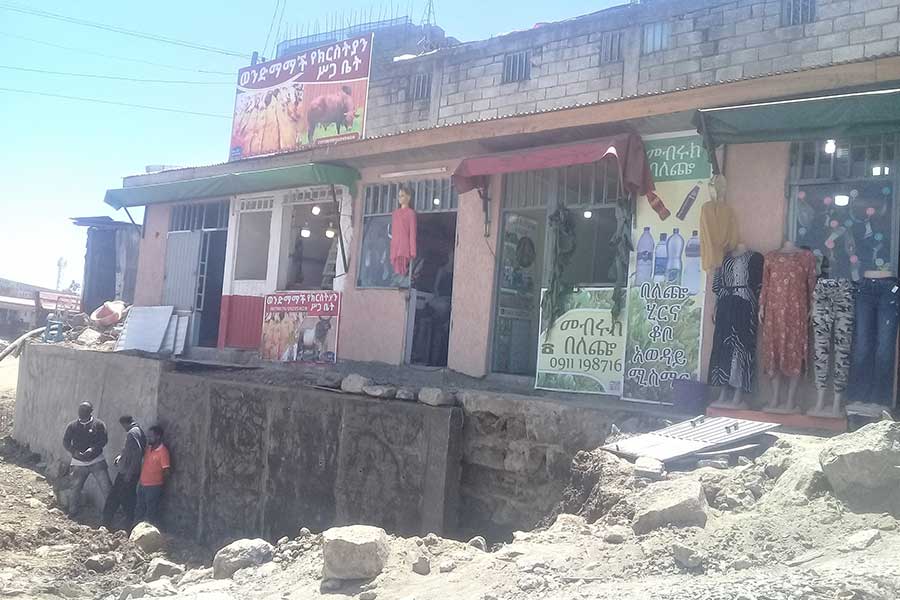
Radar | Feb 17,2024
"Taxi?" asks Abdulmunin Mohammed, peeking his head out from his grey Toyota Vitz at passersby he thinks look like they are waiting for a ride. He is on the lookout for his next potential customer.
This is one of the methods he has turned to for finding customers after the country-wide internet shutdown came into effect since Tuesday, June 30, 2020. The company he used to work for, Ride, a major taxi-hailing company, has stopped operations due to the shutdown.
"We tried to contact the call centre to see what options there were," he said, "but we couldn't get through."
Abdulmunin, 25, used to make close to 1,600 Br a day before the onset of the Novel Coronavirus (COVID-19) and 1,000 Br after March. Now with the internet shutdown, he makes around 400 Br a day. This is if he gets a call directly from clients who already know him.
Adapting and improvising when internet shutoffs happen in the country is something most businesses and entrepreneurs have accustomed themselves to. In the past four years, internet has been shut off 13 times in the country, varying from just specific regions to countrywide events and from mobile networks to total closure, according to a compiled report by Access Now, a digital rights advocacy organisation.
It is not just the drivers but the taxi hailing companies, like ZayRide, who have started using alternatives. The company is now using direct calls to reach clients.
This was done primarily to continue providing services to clients, according to Habtamu Tadesse, CEO of the company.
“We've waived the 10pc commission fees we take from drivers,” he said. "A lot of the drivers used to work for other companies, so we understood they needed this support."
The company, with over 8,000 drivers, now employs 15 call centre operators tasked with connecting drivers with customers. The application, however, was the basis for 45pc of their business.
“In this past two weeks, we've lost half a million Birr in revenues,” said Habtamu. “We'd done aggressive marketing through television and radio, and we were just seeing the returns when this occurred.”
The waived commission fees, however, cannot be a long-term strategy as it is the revenue stream of the taxi hailing company.
“We're doing this in the hope that internet will be back tomorrow,” he said. “And if not tomorrow, then the day after.”
ZayRide has put in its request to get internet connectivity back from Ethio telecom, the sole telecom operator in the country. Ethio telecom has been giving select businesses and financial institutions internet service on a case by case basis. Financial institutions, businesses involved in import and export, and specifically the horticulture and coffee industries are some examples.
The process requires only a letter of request to Ethio telecom, stating the reasons why the business deems it essential to have internet service back along with the company's IP address.
ZayRide's application, submitted on Tuesday, July 7, 2020 , is pending approval.
Businesses engaged in e-commerce have also been directly affected. Online delivery businesses, which had shown growth as more users and clients flock online due to COVID-19, are now faced with the latest challenge.
ZayRide, a taxi-hailing company, has turned to its call centre after the internet shutdown rendered its application useless.
A good example is Deliver Addis. The online food delivery and e-commerce company’s daily deliveries grew by 630pc since April.
The company received its third round of capital injection from investors two months ago, and it has been growing steadily over the past three years, according to Feleg Tsegaye, the founder.
“Internet connectivity is fairly essential for an e-commerce business like ours,” Feleg said. “Initially, there was also the security issue since Tuesday as people weren't moving around, with or without the internet.”
But even after things calmed down, the internet shutdown has forced the business to look for alternative solutions.
“We started using SMS (Short Message System) texts as an alternative as of July 6,” he said, “but it’s not easy working with mechanisms that are hard to scale.”
However, even SMS texts are not reliable, and presenting over 100 restaurants and various other businesses over text is next to impossible, Feleg said. Customers have to already know what they want and from which business before they order.
"There've been hiccups like this in the past, and it's an uphill battle," he said. "The internet shutdown will impact businesses that are digital and otherwise, in terms of attracting investors."
"We sit in between the traditional and modern economy, and so it'll have a domino effect on everyone," he said.
The accompanying effect is undisputed as businesses using Deliver Addis's platform have also been indirectly struck.
“We can't support them like we used to, even though they are not specifically e-commerce,” said Feleg.
La Morena, a Mexican taqueria, dove straight into the pick-up and delivery model and listed itself on Deliver Addis's platform when COVID-19 forced customers to stay home, according to its owner, Selamawit Paulos.
“The business was going really well when it first opened in October 2019,” she said. ”A big share of the restaurant was focused on catering and events.”
But that all changed when safety measures for the pandemic were put in place and its business dropped by 90pc, according to the owner.
“Deliver Addis was our lifeline,” she said.
Now, with Deliver Addis offline, Selamawit's hope is that that clients will remember La Morena and order from her via SMS.
On a larger scale, the internet shutdown is the antithesis of advancing the digital economy, the main aspiration of the recently approved national digital strategy dubbed "The Digital Strategy for Inclusive Prosperity 2025".
Crafted by the Ministry of Innovation & Technology and in parallel to the Homegrown Economic Reform Agenda and the National 10-year Plan, it took a year in the making. One of the four pathways outlined includes attracting companies that handle the operations for a particular business process for a third-party service provider.
A firm that falls squarely within this very parameter is Apposit, an IT firm established in 2007. The company primarily works on designing, building and supporting tech platforms.
“We support Nigeria’s biggest mobile payment system, Paga,” said Adam Abate, CEO of the company. “We rely on the internet 100pc to do our work.”
The company, consequentially, has now frozen in its tracks. It has 50 employees, mostly engineers, who have stopped work since the shutdown began.
“We're making international calls, but that barely accounts for anything in terms of the work that needs to be done,” he said.
This incident will surely make investors and clients think twice about hiring from here, according to Adam.
The company, like ZayRide, has filed its request to Ethio telecom for internet access. "There isn't much clarity on how to go about it," said Adam.
The Ministry of Innovation & Technology for its part was initially focusing on creating the legal framework necessary for a digital-led economy, according to Tesfaye Alemnew, media and press service director at the Ministry.
“Issues like internet shutdowns will be explored in the implementation phase," he said. "We'll be incorporating this in the plans that will follow the strategy.”
Until such solutions are posited, however, companies that diversify to offline services, like Spotlight Communications & Marketing, will have both ends covered.
The company has 60pc of their clientelle based overseas but advantageously also works in creative and production works, according to its CEO, Samuel Bekele.
"We provide full service public relations and marketing, so we're still working," he said.
The company works with big international clients like the Bill & Melinda Gates Foundation, USAID and the Jack Ma Foundation.
"While clients do understand the situation, it still doesn't relieve us from operating within the agreed upon timeline," he said.
It was initially a blessing in disguise, with a flow of clients migrating to digital marketing since the onset of COVID-19, according to Samuel, who says that his company has lost two million Birr in the past 10 days alone and has not been able to process payments.
“It's now extremely discouraging to venture into e-commerce,” he said.
Overall, telecom service availability will be considered under the Ethiopian Communications Authority, a recently established independent telecom and radiofrequency regulatory body.
While the Authority does not have the mandate to make decisions on whether or not internet shutdowns occur, it will be working toward ensuring service availability, according to Balcha Reba, director-general of the Authority.
“This will be done with all stakeholders including the security apparatus of the country in a way that balances the interest of customers and the country at large,” Balcha said.
Perhaps this will answer the many questions raised from businesses in the near future. Questions on whether alternate and creative solutions should be explored when it comes to limiting internet service. Most understand the reasoning behind it but desperately hope that it will not be the only recourse to address issues in the future.
Justifications for the internet shutdown itself have varied. Organising illegal activities, inciting violence and cyber attacks have been among the reasons given in the past, according to Berhan Taye, a senior policy analyst at Access Now.
“The reasons are both questionable and legitimate,” she said. “But we need to understand that the problem is not the internet itself but rather problems on the ground that require resolutions and mediations on the ground.”
The internet doesn't exist on its own but is merely a reflection of what is happening in reality, according to Berhan.
"The solution needs to rest on a sustainable national dialogue," Berhan told Fortune.
Another question that needs to be raised when we consider the effectiveness of the measure is internet penetration, suggests Berhan.
Ethio telecom service users have now reached 45.6 million, a penetration rate of 45.4pc. Out of its total customer base, 44 million use mobile devices, 21.7 million use data and one million are fixed-line users out of a population of over 100 million.
"This is a recurring problem, and shutting down the internet cannot be a solution to the problem," said Berhan.
The internet shutdown also limits competitive narratives about what is happening in the country, according to the analyst.
"We have only one narrative coming out," Berhan said.
Attempts to reach Frehiwot Tamiru, the CEO of Ethio telecom, for this story bore no fruit.
PUBLISHED ON
Jul 13,2020 [ VOL
21 , NO
1055]

Radar | Feb 17,2024

Radar | Jul 03,2021

View From Arada | Apr 30,2022

Exclusive Interviews | Apr 19,2025

Commentaries | Jul 10,2020

Fortune News | Apr 04,2020

Radar | Sep 04,2021

Radar | Mar 07,2020

Life Matters | Dec 17,2022

Fortune News | Aug 31,2019

Dec 22 , 2024 . By TIZITA SHEWAFERAW
Charged with transforming colossal state-owned enterprises into modern and competitiv...

Aug 18 , 2024 . By AKSAH ITALO
Although predictable Yonas Zerihun's job in the ride-hailing service is not immune to...

Jul 28 , 2024 . By TIZITA SHEWAFERAW
Unhabitual, perhaps too many, Samuel Gebreyohannes, 38, used to occasionally enjoy a couple of beers at breakfast. However, he recently swit...

Jul 13 , 2024 . By AKSAH ITALO
Investors who rely on tractors, trucks, and field vehicles for commuting, transporting commodities, and f...

Jul 5 , 2025
Six years ago, Ethiopia was the darling of international liberal commentators. A year...

Jun 28 , 2025
Meseret Damtie, the assertive auditor general, has never been shy about naming names...

Jun 21 , 2025
A well-worn adage says, “Budget is not destiny, but it is direction.” Examining t...

Jun 14 , 2025
Yet again, the Horn of Africa is bracing for trouble. A region already frayed by wars...